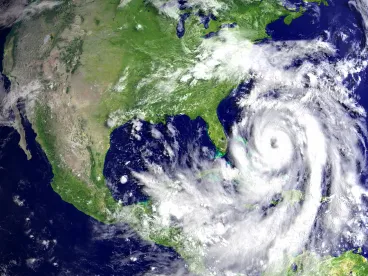Maritime contracts for services generally include clauses for performance, demurrage, deviation, termination, and suspension. Performance may be affected by an Act of God or Force Majeure clause and event. A typical Force Majeure clause reads as follows:
Except for the duty to make payments hereunder when due, and the indemnification provisions under this Agreement, neither Company nor Contractor shall be responsible to the other for any delay, damage or failure caused by or occasioned by a Force Majeure Event as used in this Agreement. “Force Majeure Event” includes: acts of God, action of the elements, warlike action, insurrection, revolution or civil strife, piracy, civil war or hostile action, strikes, differences with workers, acts of public enemies, federal or state laws, rules and regulations of any governmental authorities having jurisdiction in the premises or of any other group, organization or informal association (whether or not formally recognized as a government); inability to procure material, equipment or necessary labor in the open market acute and unusual labor or material or equipment shortages, or any other causes (except financial) beyond the control of either Party. Delays due to the above causes, or any of them, shall not be deemed to be a breach of or failure to perform under this Agreement.
A. Act of God
Act of God or Force Majeure is a defense to many contractual obligations, including performance, deviation, and demurrage. It may also be the basis to suspend or terminate a maritime agreement for cause. It is defined as an abnormal natural event that is overwhelming and cannot be forestalled nor controlled. Skandia Ins. Co., Ltd. V. Star Shipping, AS, 173 F.Supp. 2d 1228 (S.D. Ala. 2001) (Hurricane Georges cargo claim). It is also a defense to certain tort claims like collisions and allisions occurring during a storm. Petition of U.S., Heide Shipping & Trading v. S.S. Joseph Lykes, 425 F.2d 991 (5th Cir. 1970) (vessel break-away in Hurricane Betsy).
When plead, a party must demonstrate that it was prudent in predicting and attempting to avoid the impact of the overwhelming and unexpected natural event and took reasonable precautions under the circumstances. A failure to perform or third party tort damages are not subject to an Act of God defense if the failure results from human agency, neglect or an unseaworthy condition. Compania DeVapores Ins. Co., SA v. Mo-Pac R.R. Co., 232 F.2d 657 (5th Cir. 1985) (cargo claim for failure to take reasonable steps to guard against wind storm).
Following Hurricane Katrina, the U.S. District Court for the Eastern District of Louisiana held that a category 4 or 5 hurricane was an Act of God sufficient to bar a tort claim by a marina owner against the owner of a vessel that broke away from her berth, drifted and hit another vessel. The defense of Act of God applied because, 1) the accident was due exclusively to abnormal natural events without human interest, and (2) there was no intervening negligent behavior by the vessel owner. J.W. Stone Oil Dist., LLC v. Bollinger Shipyard, 2007 WL 2710809 (E.D. La. 2007). Judge Lemmon held in Stone Oil that hurricanes are considered as a matter of law to be an Act of God and defensible unless there is an intervening and contributing act of individual negligence. This obligation includes taking reasonable precautions based upon all available information.
In Simmons v. Lexington Ins. Co., 2010 WL 1254638 (E.D. La. 2010), aff’d., 401 Fed. Appx. 903 (5th Cir. 2010), J), the courts similarly considered whether reasonable precautions had been taken by a marina to protect a sailboat during Hurricane Katrina under both Louisiana and maritime law. The Court reviewed other Katrina cases, including Conagra Trade Group, Inc. v. AEP Memco, LLC, 2009 WL 2023174 (E.D. La. 2009), and Coex Coffee Int’l., Inc. v. Dupuy Storage & Forwarding, LLC, 2008 WL 1884041 (E.D. La. 2008). (Katrina’s unprecedented flooding and devastation was an Act of God defense.) In Conagra, supra, Judge Fallon was asked to review a contract of affreightment for a cargo of wheat aboard a barge that sunk. Memco was found not negligent in delivering its barge of cargo to an affected berth several days before the weather forecast accurately predicted the landfall of Katrina.
In re S.S. Winged Arrow, 425 F.2d 991 (5th Cir. 1970), affirmed that where a vessel had been sufficiently moored based upon the anticipated path of Hurricane Betsy, the Act of God defense applied to relieve its owner of tort damages resulting from its breakaway. From a review of the case law involving severe weather events, it is apparent that Act of God defenses will be granted as a defense to both third party tort claims and also contractual claims for failure to perform where reasonable decisions and precautionsunder the circumstances have been made.
B. Performance Clauses
Clauses for demurrage, detention or laytime usually involve delays in the loading or unloading of cargo or the delivery of goods and materials. Laytime is the period of time allowed for loading and unloading. Demurrage and detention are sums paid to compensate for time lost related to the delivery of equipment or cargo. Demurrage begins to run after the passage of laytime or the agreed time of delivery and performance. Damages are awarded for failure to perform. Deviation is an obligation to maintain a proper course in ordinary trade and to timely arrive at the agreed destination. All deviation clauses are subject to certain liberties. Any deviation may affect insurance and hire.
Typically a contract for maritime services can be terminated for cause or for convenience. Similarly, parties may negotiate terms to suspend performance, which would suspend payment of hire and performance of services. A suspension clause is typically an off-hire clause where the contract terms remain but no hire is paid. Usually a vessel owner will be compensated and reimbursed for certain additional expenses if a contract is terminated for convenience. An Act of God clause excuses delays in performance, but in most cases serves to either suspend performance or terminate the contract for cause as between the parties.
Similar defenses are also statutorily allowed under COGSA. Under the COGSA “perils of the sea” defense, a carrier and vessel are not liable for cargo damage proximately caused by an Act of God where the carrier is not independently negligent and its vessel seaworthy when confronted with an unexpected and abnormal event of nature. 46 USC 1304(2) (c) & (d) ; J.Gerber & Co. v S/S SABINE HOWALDT 437 F.2d. 580 (2nd Cir. 1971); Taisho Marine & Fire Ins. Co. v. Sea-Land ENDURANCE 815 F. 2d. (9th Cir. 1270).
C. Conclusion
The purpose of an Act of God clause in a contract or asserted as a defense to a maritime tort is to relieve a defendant from liability for performance and damages where there was an extreme natural event. Whether a particular storm or natural event is considered an ACT OF GOD is a question of fact. The factors to be considered in accessing an ACT OF GOD/FORCE MAJEURE include the intensity of the natural event and whether the conditions would normally be expected. In order to avail oneself of the ACT OF GOD defense a defendant must show a causal connection between the loss and the peril as well as defendant’s freedom from fault.




 />i
/>i

